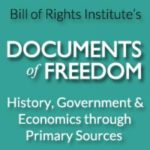How do educators invest in productive, deep, and transformative dialogue in their classrooms? Civic Conversations is a collaboration between the Edward M. Kennedy Institute’s civic education programming and the community-building dialogic structure practiced by Essential Partners. Explore resources, activities, and lesson structures that support educators as they facilitate difficult conversations, create inclusive learning environments, raise complex discussions, and promote a safe space for students to consider their values and engage in their communities. Policy simulations at the Kennedy Institute reflect the wide range of issues that face our country today. Students debate the best way to reform our immigration system, consider the balance between privacy and security, and think about how to meet the challenge of climate change. As in the real Senate, it’s natural that students will disagree on the best approach to many civic issues. This collection of resources will support educators as they prepare to discuss civic issues, either in preparation for a Kennedy Institute field trip or to practice listening, sharing, and learning in the classroom.
Jury Service: Our Duty and Privilege as Citizens
In America, the responsibility to protect individual rights and promote the common good ultimately rests with its citizens, not the government. When citizens participate in thoughtful and responsible ways, the welfare of our constitutional democracy is ensured. While most civic participation is voluntary, the call to serve on a jury is not. It comes as an order by the court.
Responsibility and Community Service
This lesson explores how groups of people (or animals) come together to solve community problems. Students will identify a variety of personal responsibilities and civic responsibilities from a set of pictures in order to get a better understanding of what responsibility means. Students will understand that citizens in the United States have a responsibility to help others.
Academy for American Democracy Educational Videos
This video playlist is part of the New-York Historical Society’s Academy for American Democracy, an educational initiative focusing on history and civics education for sixth grade students. Videos explore the ideals of democracy, civic participation, the evolution of Ancient Athenian and American democracy, and the power of the people within democracies.
Civics and Citizenship
Civics and Citizenship explores both the rights guaranteed to Americans as well as the attendant responsibilities that come with those rights. Ultimately, the unit culminates with students writing, producing, and sharing a Public Service Announcement that defines, shows, and advocates for civic engagement. The goal of the lesson is that students actively assume the responsibilities of an engaged and thoughtful citizen.
Making Civics Real
A multimedia workshop for high school civics teachers. It includes 8, 1-hour video programs, a print guide to the workshop activities, and a website. The goal of this workshop is to give teachers new resources and ideas to reinvigorate civic education. The series presents authentic teachers in diverse school settings modeling a variety of teaching techniques and best practices in a variety of social studies courses from a 9th-grade government/civics/econ course, to a 12th-grade law course
What Does It Mean to Be a Good Citizen?
This is the first lesson in Khan Academy’s new high school civics course. This lesson focuses on what it means to be a good citizen, what civil society is, and what are democratic principles and civic virtues.
Civics 360
Civics 360 is a comprehensive guide to middle school civics. Civics is all around us. Being informed about civics takes work. There is a lot to know about the government and how “We the People” interact with the government and each other. Use the resources in the modules to enhance your civic knowledge and skills.
Documents of Freedom: History, Government, and Economics Through Primary Sources

This complete online textbook covers American history, government, and economic concepts. Resources include readings for students, activity directions for teachers, and handouts that are downloadable and printable for classroom use. Content is geared toward students in grades 8-12. All materials are aligned with Common Core and individual state standards.
Strengthening Democracy in America
Strengthening Democracy in America is a collection of free courses featuring video interviews with noted scholars. These courses will deepen your understanding of the American political system and your rights and responsibilities in it. The first two courses provide a framework for understanding the history and development of the system. Subsequent courses focus on its strengths and weaknesses and means of enhancing the strengths and diminishing the weaknesses. The courses are open to anyone and can be completed at your own pace.